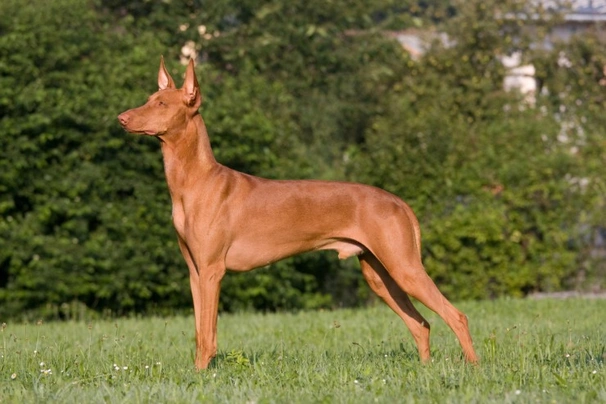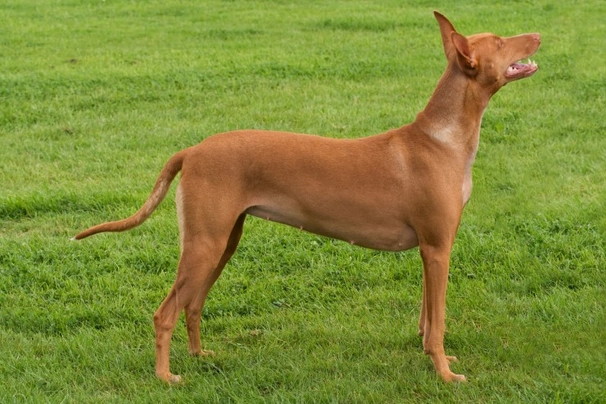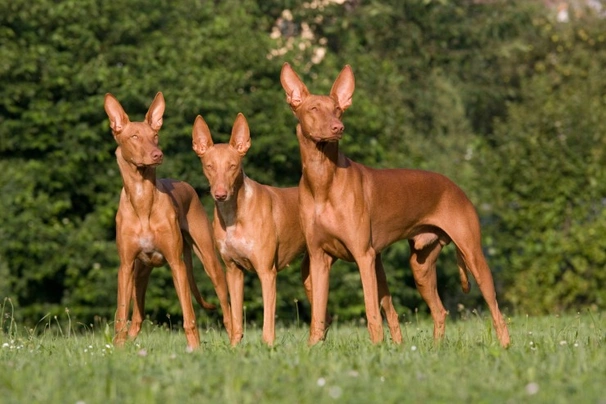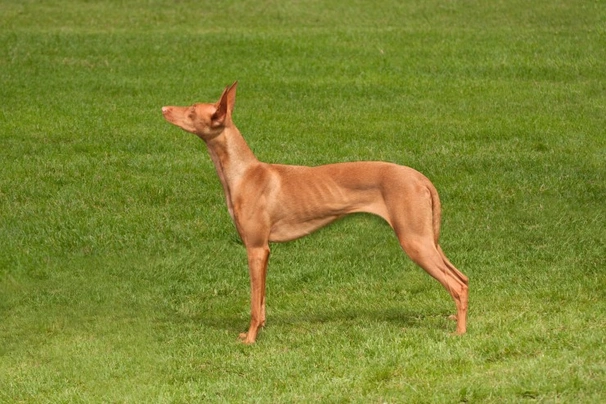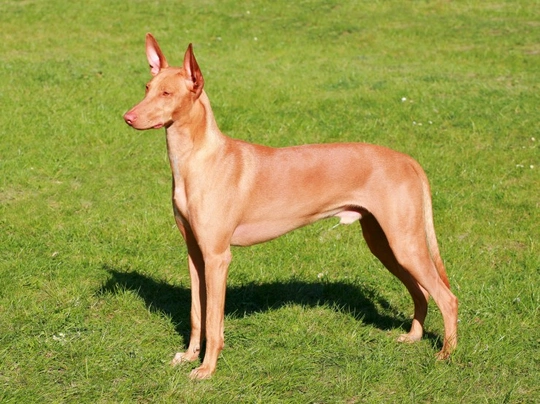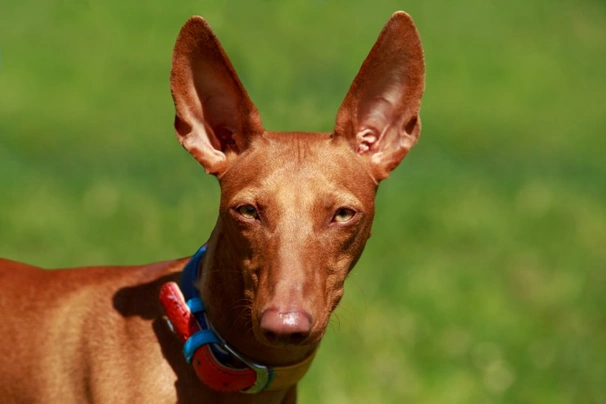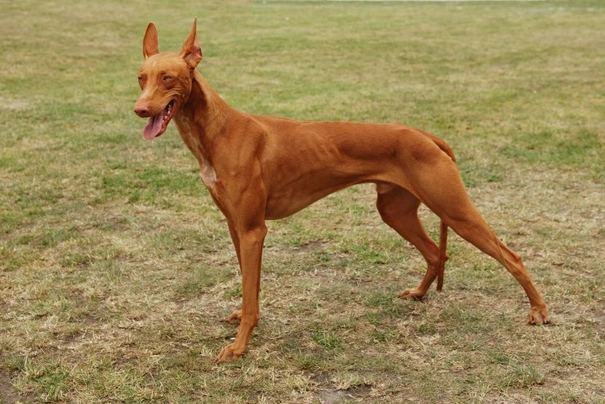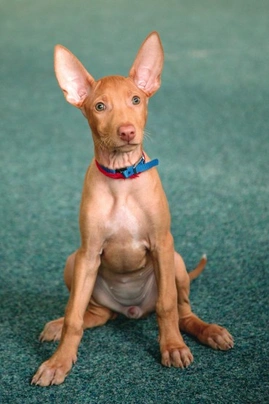Pharaoh Hound
Pros
Cons
Introduction of the Pharaoh Hound
Pharaoh Hounds are thought to be one of the oldest breeds on the planet. They are elegant noble dogs that over the ages have found their way into the hearts and homes of many people throughout the world thanks to their distinctive looks kind and loyal natures. However the breed is still quite rarely seen in the UK and anyone wanting to share a home with a Pharaoh Hound would need to register their interest with breeders for the pleasure of doing so.
Pharaoh Hounds true to their breeding are never happier than when they are kept busy and as such they are not the best choice for first time owners because they need to be trained and handled by someone who is familiar with the needs of this type of energetic hound. They thrive in households where one person usually stays at home when everyone else is out and they make great companions and family pets for people who boast large secure very high fenced back gardens.
History of the Pharaoh Hound
The Pharaoh Hound is thought to be one of the oldest domesticated breeds in the world with similar hounds having been around since the Ancient Egyptians. However the exact origins of the breed remain a bit of a mystery. With this said artefacts have been found in Pharaoh's tombs and hieroglyphs on walls show a similar type of hound that could well be the Pharaoh's Hounds ancestor.
It was in the 1950s that the remains of a hunting dog were discovered while excavating Queen Her-Neith’s tomb in Saqqara. The skeletal remains are very similar to that of the Pharaoh Hound. In ancient times these hounds were used to hunt small game but they were also the loyal companions of Pharaohs. Some people believe these hounds were introduced to Malta by the Phoenicians when they occupied the island in 1000 BC. With this said there is some evidence of the breed originating in Malta and that they were taken to Egypt by travellers and traders in ancient times. Today the Pharaoh Hound is Malta's national dog and are known as the Kelb Tal-Fenek which literally translated means 'Dog of the rabbit'.
What is known is that the Pharaoh Hound was developed in Malta even though the breed may have originated in Egypt over the following 2000 years after which they were introduced to the island of Malta. These hounds have always been highly prized by Maltese farmers for their hunting skills and as such the breed was carefully preserved to ensure lines remained pure.
A lady called Pauline Block who was living on Malta purchased a Pharaoh Hound called Bahri which she bought back to the UK with her in 1963. Another hound called Luki and a female called Chu-Cha was imported by a family called Liddell-Grainger the same year. They were to produce the first litter to be born in the UK. With this said it is thought that the first Pharaoh Hounds were imported to England during the 1930’s but the hounds were never bred from. Today anyone hoping to share their homes with one of these proud and noble dogs might find it hard to find a breeder because very few puppies are registered every year with the kennel club here in the UK. The good news is that once prospective owners register their interest with breeders and go on a waiting list the wait would be well worth it.
Interesting facts about the breed
- Is the Pharaoh Hound a vulnerable breed? No although they are still quite rarely seen in the UK. With this said the breed’s popularity is increasing with more well-bred puppies being registered with the Kennel Club every year.
- Pharaoh Hounds are one of the most ancient breeds on the planet
- They have always been highly prized for their hunting abilities
- They are one of the most vocal of all “sight hounds”
- There is some evidence that the breed originated in Malta
- Pharaoh Hounds blush and smile when they are excited
- They have incredible hearing
- They are often used to hunt prey with ferrets
- Pharaoh Hounds were recognised by the Kennel Club in 1974
- The first Pharaoh Hound to be exhibited at Crufts was a dog called Birling Zahara in 1970
Appearance of the Pharaoh Hound
Height at the withers: Males 56 - 63 cm Females 53 - 61 cm
Average Weight: Males 20 - 25 kg Females 20 - 25 kg
Pharaoh Hounds are elegant noble looking medium sized dogs that boast an extremely athletic and graceful appearance about them. A unique trait of these lovely hounds is that they blush when they get excited and this sees the skin on their noses and on the insides of their ears turn a rosy pink colour. Their heads are quite long yet lean and nicely chiselled which adds to their noble appearance. Their forefaces are slightly longer than a dog's skull with dog's only having a slight stop.
Their eyes are an amber colour to match their coats and are quite deeply set with dogs always having an intelligent alert and keen look in them. Ears are set quite high which dogs carry erect when they are excited being broader at the base large and fine to the touch. The Pharaoh Hound has a strong jaw with a perfect scissor bite where their upper teeth neatly overlap their lower ones. Their noses are flesh coloured so they blend in with a dog's coat.
Their necks are lean well-muscled and long which dogs carry slightly arched and which adds to their noble appearance. Shoulders are long well laid back and strong with Pharaoh Hounds having straight and powerful front legs. Their body is athletic lithe with a virtually level topline although it slopes slightly from the croup to the root of a dog's tail. Their brisket is deep with dogs having well sprung ribs.
Hindquarters are muscular and strong with dogs having well developed second thighs and strong back legs. Feet are well knuckled strong and firm with pads being nicely padded. Their tails are thicker at the root but taper to the tip which dogs carry high and curved when they are excited and lower when they are relaxed and at rest.
When it comes to their coat the Pharaoh Hound boasts having a short and very glossy coat that can be anything from quite fine and close to the touch right through to having a slightly harsher feel to it. The accepted breed colours for Kennel Club registration are as follows:
- Rich Tan
- Tan
- Tan & White Markings
Pharaoh Hounds should have a white tip to their tail as well as a white star on their chests. Dogs are allowed to have a bit of white on their toes and a very slight white blaze is allowed on the centre of their faces.
It is worth noting that the accepted breed colours for Kennel Club registration can differ from those set out in the breed standard which are as follows:
- Tan
- Rich tan with white markings – white tip on tails white star on chest white on toes slim blaze on the line of a dog’s face
Gait/movement
When a Pharaoh Hound moves they do so with a tremendous amount of grace. They take free moving flowing strides holding their heads quite high and covering a lot of ground when they do.
Faults
The Kennel Club frowns on any exaggerations or departures from the breed standard and would judge the faults on how much they affect a dog's overall health and wellbeing as well as their ability to perform.
Males should have both testicles fully descended into their scrotums and it is worth noting that a dog can be a little lighter or heavier as well as slightly taller or shorter than set out in the Kennel Club breed standard which is only given as a guideline.
Temperament of the Pharaoh Hound
Pharaoh Hounds are known to be quite independent thinkers but they form strong bonds with their owners and families. They are quite placid although they are also known to be quite fun-loving in a home environment too. They enjoy being around people and if they have grown up with children in the house they generally get on very well together.
However they are extremely high energy hounds and as such they are not the best choice for people who lead more sedentary lives. They are not the best of choices for first time owners either because these sensitive hounds need to be trained and handled by someone who is familiar with the breed or similar type of dog. They are however a good choice for people who lead active outdoor lives and who live in the country where a dog can run around off their lead so they can really let off steam as long as it is in a safe environment and dogs have been taught to respond well to the recall command.
If a Pharaoh Hound is not given enough daily mental stimulation or exercise they quickly get bored and this can lead to a dog developing all sorts of behavioural issues which includes being destructive around the home and suffering from separation anxiety. Pharaoh Hounds need to be well socialised from a young age and this has to involve introducing them to new situations people noise animals and other dogs as soon as they have been fully vaccinated for them to grow up into well-rounded more confident mature dogs.
They are quite demanding and as such are not suitable for people who do not have the time it takes to care for such high energy dogs. They are best suited to households where at least one person usually stays at home when everyone else is out. They tend to be a little wary and standoffish when they meet anyone for the first time but rarely would a Pharaoh Hound show any sort of aggressive behaviour towards a stranger preferring to keep their distance until they get to know them.
Are they a good choice for first time owners?
Pharaoh Hounds are better suited to people who are familiar with the needs of an intelligent high energy hound bearing in mind that they must be well-socialised from a young age so they mature into confident mature dogs. Without the right sort of socialisation handling and training a Pharaoh Hound could quickly take on a more dominant role making them unruly and harder to live with.
What about prey drive?
Pharaoh Hounds have a very high prey drive which is a trait that is deeply embedded in their psyche. As such care must always be taken as to where and when a dog can run off the lead more especially if there is wildlife or livestock close by.
What about playfulness?
Pharaoh Hounds are real clowns and are known to have a very playful side to their natures. They love to entertain and be entertained which is why they are so much fun to have around. They are known to be a little mischievous when the mood takes them and being so clever a Pharaoh Hound quickly learns how to get their own way when they mood takes them.
What about adaptability?
Pharaoh Hounds are better suited to people who have secure well-fenced back gardens that a dog can safely roam in whenever possible bearing in mind that fences must be high enough to keep an athletic high-energy hound in.
What about separation anxiety?
Pharaoh Hounds form strong ties with their families and dogs are never very happy when they find themselves left on their own for longer periods of time. They are better suited to people who either work from home or in households where one person stays at home when everyone else is out so they are never alone for any length of time which could see a dog suffering from separation anxiety. This can lead to them being destructive around the home which is a dog's way of relieving any stress they are feeling and a way to keep themselves entertained which typically includes barking incessantly to get attention.
What about excessive barking?
Pharaoh Hounds are known to be the most “vocal” of all sighthounds and like the sound of their own voices a little too much. This is something that needs to be gently nipped in the bud when a dog is still young being careful not to frighten them although even with the best training it is hard to stop a Pharaoh Hound from voicing an opinion when they want to.
Do Pharaoh Hounds like water?
Some Pharaoh Hounds like swimming and will take to the water whenever they can more especially when the weather is hot. However if anyone who owns a dog that does not like water should never force them to go in because it would just end up scaring them. With this said care should always be taken when walking a Pharaoh Hound off the lead anywhere near more dangerous watercourses just in case a dog decides to leap in and then needs rescuing because they cannot get out of the water on their own.
Are Pharaoh Hounds good watchdogs?
Pharaoh Hounds are natural watchdogs and are always quick off the mark to let an owner know when there are strangers about although they would rarely do this aggressively preferring to stand their ground and bark.
Intelligence / Trainability of the Pharaoh Hound
The Pharaoh Hound is an intelligent dog and therefore they are quite easy to train. However because of their high prey drive they are not the most obedient of hounds when it comes to the "recall" command which is why their training has to start early in their lives. Their training has to be consistent and always fair with these hounds not responding well to any sort of harsh correction or heavier handed training methods because like a lot of other hounds they are quite sensitive by nature.
In the right hands and with the correct amount of training Pharaoh Hounds excel in all sorts of canine sports and this includes activities like agility and obedience. It would be fair to say that at times these hounds are far too quick thinking for their own good which often sees them outsmarting their owners. This is one of the reasons they are not the best choice for novice dog owners who may inadvertently send a dog the wrong signals which they quickly pick up on and which could end up with a Pharaoh Hound becoming wilful and unruly.
Like all puppies Pharaoh Hound puppies are incredibly cute with their large ears and oversized paws which means it is all too easy to spoil them when they first arrive in their new homes. As soon as a puppy is nicely settled in owners must start out as they mean to go on which means laying down rules and boundaries. This helps establish a pecking order in a household and it helps puppies understand what is expected of them and what is acceptable behaviour. The first commands a puppy should be taught are as follows:
- Come
- Sit
- Stay
- Heel
- Quiet
- Leave it
- Down
- Bed
Children and other
When Pharaoh Hounds grow up with children in the home they are usually very well behaved around them. However any interaction between a dog and children and more especially toddlers needs to be supervised by an adult to make sure things stay calm and playtime does not turn too boisterous.
Rarely would a Pharaoh Hound show any sort of aggressive behaviour towards other dogs because they are known to be quite sociable by nature. When they have been well socialised from a young age Pharaoh Hounds enjoy the company of other dogs they meet and would rarely be the first to show any sort of aggressive behaviour. However care should be taken when they are around any small animals cats and other pets because of their high prey drive which would get the better of them.
Health of the Pharaoh Hound
The average life expectancy of a Pharaoh Hound is between 12 and 14 years when properly cared for and fed an appropriate good quality diet to suit their ages.
Like so many other breeds the Pharaoh Hound is known to suffer from a few hereditary health issues which are worth knowing about if you are planning share your home with one of these active and noble looking hounds. The conditions that seem to affect the breed the most include the following:
- Hip dysplasia – dogs can be hip scored by a BVA registered vet
- Luxating Patellas - Breed Club Scheme test available
- Eye problems
- Skin Allergies
- Bloat/gastric torsion
What about vaccinations?
Pharaoh Hound puppies would have been given their initial vaccinations before being sold but it is up to their new owners to make sure they have their follow-up shots in a timely manner with the vaccination schedule for puppies being as follows:
- 10 -12 weeks old bearing in mind that a puppy would not have full protection straight away but would be fully protected 2 weeks after they have had their second vaccination
There has been a lot of discussion about the need for dogs to have boosters. As such it's best to talk to a vet before making a final decision on whether a dog should continue to have annual vaccinations which are known as boosters.
What about spaying and neutering?
A lot of vets these days recommend waiting until dogs are slightly older before spaying and neutering them which means they are more mature before undergoing the procedures. As such they advise neutering males and spaying females when they are between the ages of 6 to 9 months old and sometimes even when a dog is 12 months old.
Other vets recommend spaying and neutering dogs when they are 6 months old but never any earlier unless for medical reasons. With this said many breeds are different and it is always advisable to discuss things with a vet and then follow their advice on when a dog should be spayed or neutered.
What about obesity problems?
Like other breeds some Pharaoh Hounds gain weight after they have been spayed or neutered and it's important to keep an eye on a dog's waistline just in case they do. If a dog starts to put on weight it's important to adjust their daily calorie intake and to up the amount of exercise they are given. Older dogs too are more prone to gaining weight and again it's essential they be fed and exercised accordingly because obesity can shorten a dog's life by several years. The reason being that it puts a lot of extra strain on a dog's internal organs including the heart which could prove fatal.
What about allergies?
Pharaoh Hounds are known to suffer from allergies and some may have constant flare ups so it's important for a dog to see a vet sooner rather than later. Allergies can be notoriously hard to clear up and finding the triggers can be challenging. With this said a vet would be able to make a dog with an allergy more comfortable while they try to find out the triggers which could include the following:
- Certain dog foods that contain high levels of grains and other cereal type fillers
- Airborne pollens
- Dust mites
- Environment
- Flea and tick bites
- Chemicals found in everyday household cleaning products
Participating in health schemes
All responsible Pharaoh Hound breeders would ensure that their stud dogs are tested for known hereditary and congenital health issues known to affect the breed by using the following schemes:
- Patella testing through the Breed Club Scheme which is a voluntary scheme
- Hip dysplasia – dogs can be hip scored by a BVA registered vet or through the Animal Health Trust (AHT)
What about breed specific breeding restrictions?
Apart from the standard breeding restrictions for all Kennel Club recognised breeds there are no other breed specific breeding restrictions for the Pharaoh Hound.
What about Assured Breeder Requirements?
The Kennel Club strongly recommends that all breeders use the following scheme on dogs:
Caring for the Pharaoh Hound
As with any other breed Pharaoh Hounds need to be groomed on a regular basis to make sure their coats and skin are kept in top condition. They also need to be given regular daily exercise to ensure they remain fit and healthy. On top of this dogs need to be fed good quality food that meets all their nutritional needs throughout their lives.
Caring for a Pharaoh Hound puppy
Pharaoh Hound puppies are boisterous and full of life which means it's essential for homes and gardens to be puppy-proofed well in advance of their arrival. A responsible breeder would have well socialised their puppies which always leads to more outgoing confident and friendly dogs right from the word go. With this said any puppy is going to feel vulnerable when they leave their mother and littermates which must be taken into account. The longer a puppy can remain with their mother the better although it should never be for too long either.
It's best to pick a puppy up when people are going to be around for the first week or so which is the time needed for a puppy to settle in. Puppy-proofing the home and garden means putting away any tools and other implements that a boisterous puppy might injure themselves on. Electric wires and cables must be put out of their reach because puppies love chewing on things. Toxic plants should be removed from flowerbeds and the home too.
Puppies need to sleep a lot to grow and develop as they should which means setting up a quiet area that's not too out of the way means they can retreat to it when they want to nap and it's important not to disturb them when they are sleeping. It's also a good idea to keep "playtime" nice and calm inside the house and to have a more active "playtime" outside in the garden which means puppies quickly learn to be less boisterous when they are inside.
The documentation a breeder provides for a puppy must have all the details of their worming date and the product used as well as the information relating to their microchip. It is essential for puppies to be wormed again keeping to a schedule which is as follows:
- Puppies should be wormed at 6 months old
- They need to be wormed again when they are 8 months old
- Puppies should be wormed when they are 10 months old
- They need to be wormed when they are 12 months old
Things you'll need for your puppy
There are certain items that new owners need to already have in the home prior to bringing a new puppy home. It's often a good idea to restrict how much space a puppy plays in more especially when you can't keep an eye on what they get up to bearing in mind that puppies are often quite boisterous which means investing in puppy gates or a large enough playpen that allows a puppy the room to express themselves while keeping them safe too. The items needed are therefore as follows:
- Good quality puppy or baby gates to fit on doors
- A good well-made playpen that's large enough for a puppy to play in so they can really express themselves as puppies like to do
- Lots of well-made toys which must include good quality chews suitable for puppies to gnaw on bearing in mind that a puppy will start teething anything from when they are 3 to 8 months old
- Good quality feed and water bowls which ideally should be ceramic rather than plastic or metal
- A grooming glove
- A slicker brush or soft bristle brush
- Dog specific toothpaste and a toothbrush
- Scissors with rounded ends
- Nail clippers
- Puppy shampoo and conditioner which must be specifically formulated for use on dogs
- A well-made dog collar or harness
- A couple of strong dog leads
- A well-made dog bed that's not too small or too big
- A well-made dog crate for use in the car and in the home that's large enough for a puppy to move around in
- Baby blankets to put in your puppy's crate and in their beds for when they want to nap or go to sleep at night
Keeping the noise down
All puppies are sensitive to noise including Pharaoh Hound puppies bearing in mind that they are a lot more sensitive than many other breeds. It's important to keep the noise levels down when a new puppy arrives in the home. TVs and music should not be played too loud which could end up stressing a small puppy out with the result being they are withdrawn timid and shy.
Keeping vet appointments
As previously mentioned Pharaoh Hound puppies would have been given their first vaccinations by the breeders but they must have their follow up shots which is up to their new owners to organise. The vaccination schedule for puppies is as follows:
- 10 -12 weeks old bearing in mind that a puppy would not have full protection straight away but would only be fully protected 2 weeks after they have had their second vaccination
When it comes to boosters it's best to discuss these with a vet because there is a lot of debate about whether a dog really needs them after a certain time. However if a dog ever needed to go into kennels their vaccinations would need to be fully up to date.
What about older Pharaoh Hounds when they reach their senior years?
Older Pharaoh Hounds need lots of special care because as they reach their golden years they are more at risk of developing certain health concerns. Physically a dog's muzzle may start to go grey but there will be other noticeable changes too which includes the following:
- Coats become coarser
- A loss of muscle tone
- Pharaoh Hounds can either become overweight or underweight
- They have reduced strength and stamina
- Older dogs have difficulty regulating their body temperature
- They often develop arthritis
- Immune systems do not work as efficiently as they once did which means dogs are more susceptible to infections
- Older dogs change mentally too which means their response time tends to be slower as such they develop the following:
- They respond less to external stimuli due to impaired vision or hearing
- They tend to be a little pickier about their food
- They have a lower pain threshold
- Become intolerant of any change
- Often an older dog can feel disorientated
Living with a Pharaoh Hound in their golden years means taking on a few more responsibilities but these are easily managed and should include looking at their diet the amount of exercise they are given how often their dog beds need changing and keeping an eye on the condition of their teeth.
Older Pharaoh Hound need to be fed a good quality diet that meets their needs at this stage of their lives all the while keeping a close eye on a dog's weight. A rough feeding guide for older dogs is as follows bearing in mind they should be fed highly digestible food that does not contain any additives:
- Protein content should be anything from 14 – 21%
- Fat content should be less than 10%
- Fibre content should be less than 4%
- Calcium content should be 0.5 – 0.8%
- Phosphorous content should be 0.4 – 0.7%
- Sodium content should be 0.2 – 0.4%
Older Pharaoh Hounds don't need to be given the same amount of daily exercise as a younger dog but they still need the right amount of physical activity to maintain muscle tone and to prevent a dog from putting on too much weight. All dogs need access to fresh clean water and this is especially true of older dogs when they reach their golden years because they are more at risk of developing kidney disorders.
Grooming of the Pharaoh Hound
Because the Pharaoh Hound's coat is short tight and close it is quite low maintenance when it comes to keeping things tidy. All it really takes to keep the sheen on a dog's coat is a weekly wipe over with a chamois leather. These hounds have very sensitive skin and as such great care has to be taken when using any sort of product on it which includes dog shampoos.
They tend to shed their coat steadily throughout the year although more so during the Spring and then again in the Autumn when more frequent grooming is usually necessary to get rid of any loose or shed hair. It has to be noted that Pharaoh Hounds are quite sensitive to the cold and as such when the weather turns very cold dogs need to wear a coat when out on a walk to prevent them getting a chill.
It's also important to check a dog's ears on a regular basis and to clean them when necessary. If too much wax is allowed to build up in a dog's ears it can lead to a painful infection which can be hard to clear up. In short prevention is often easier than cure when it comes to ear infections.
Exercise of the Pharaoh Hound
Pharaoh Hounds are extremely high-energy dogs and as such they need to be given a ton of daily mental stimulation and at least 2 hour's exercise for them to be truly happy well-rounded and obedient dogs. Their exercise has to be vigorous and should include lots of interactive games to keep these hounds focused and on their toes. The old saying of a "tired dog is a good dog" is never truer than when describing a Pharaoh Hound. When they get home after a good walk they are quite happy to chill out and relax with their owners.
A shorter walk in the morning would be fine but a longer more interesting one in the afternoon is a must. These dogs also like to be able to roam around a back garden as often as possible so they can really let off steam. However the fencing has to be extremely secure to keep these highly active dogs in because if they find a weakness in the fence they will soon escape out and get into all sorts of trouble. As a general rule any outdoor time in the garden should be supervised just in case.
With this said Pharaoh Hound puppies should not be over exercised because their joints and bones are still growing and too much pressure on them could result in causing a dog a few problems later on in their lives. They should not be allowed to jump up or off furniture nor should they be allowed to run up and down the stairs because these are the sorts of things that put a lot of strain on a dog’s joints and bones.
Feeding of the Pharaoh Hound
If you get a Pharaoh Hound puppy from a breeder they would give you a feeding schedule and it's important to stick to the same routine feeding the same puppy food to avoid any tummy upsets. You can change a puppy's diet but this needs to be done very gradually always making sure they don't develop any digestive upsets and if they do it's best to put them back on their original diet and to discuss things with the vet before attempting to change it again.
Older dogs are not known to be fussy or finicky eaters but this does not mean you can feed them a lower quality diet. It's best to feed a mature dog twice a day once in the morning and then again in the evening making sure it's good quality food that meets all their nutritional requirements. It's also important that dogs be given the right amount of exercise so they burn off any excess calories or they might gain too much weight which can lead to all sorts of health issues. Obesity can shorten a dog's life by several years so it's important to keep an eye on their waistline from the word go.
Because Pharaoh Hounds have been known to suffer from bloat it is really important that they be fed twice a day instead of giving them just one larger meal a day. It's also a good idea to invest in a stand to place their feed bowl which makes it easier for these large dogs to eat comfortably without having to stretch their necks down low to reach their food. You should never exercise a dog just before or just after they have eaten either because this puts them more a risk of developing bloat.
Feeding guide for a Pharaoh Hound puppy
Puppies need to be fed a highly nutritious good quality diet for them to develop and grow as they should. As a rough guide a Pharaoh Hound puppy can be fed the following amounts every day making sure their meals are evenly spread out throughout the day and it's best to feed them 3 or 4 times a day:
- 2 months old - 191g to 258g depending on puppy's build
- 3 months old - 223g to 292g depending on puppy's build
- 4 months old - 239g to 358g depending on puppy's build
- 5 months old - 243g to 359g depending on puppy's build
- 6 months old - 243g to 391g depending on puppy's build
- 8 months old - 211g to 345g depending on puppy's build
- 10 months old - 177g to 301g depending on puppy's build
Once a puppy is 13 months old they can be fed adult dog food
Feeding guide for an adult Pharaoh Hound
Once fully mature an adult Pharaoh Hound should be fed a good quality diet to ensure their continued good health. As a rough guide an adult Pharaoh Hound can be fed the following amounts every day:
- Dogs weighing 20 kg can be fed 215g to 273g depending on activity
- Dogs weighing 25 kg can be fed 260g to 339g depending on activity
Pharaoh Hound price
If you are looking to buy a Pharaoh Hound you may have to go on a waiting list because very few puppies are registered with The Kennel Club every year. You would need to pay anything upwards of £500 for a well-bred pedigree puppy. The cost of insuring a male 3-year-old Pharaoh Hound in northern England would be £23.67 a month for basic cover but for a lifetime policy this would set you back £43.98 a month (quote as of March 2018). When insurance companies calculate a pet's premium they factor in several things which includes where you live in the UK and a dog's age and whether they have been neutered or spayed amongst other things.
When it comes to food costs you need to buy the best quality food whether wet or dry to feed your dog throughout their lives making sure it suits the different stages of their lives. This would set you back between £40 - £50 a month. On top of this you would need to factor in veterinary costs if you want to share your home with a Pharaoh Hound and this includes their initial vaccinations their annual boosters the cost of neutering or spaying your dog when the time is right and their yearly health checks all of which quickly adds up to over a £1000 a year.
As a rough guide the average cost to keep and care for a Pharaoh Hound would be between £70 to £100 a month depending on the level of insurance cover you opt to buy for your dog but this does not include the initial cost of buying a healthy well-bred Kennel Club registered pedigree Pharaoh Hound puppy.
Buying advice
When visiting and buying any puppy or dog there are many important things to consider and questions to ask of the breeder/seller. You can read our generic puppy/dog advice here which includes making sure you see the puppy with its mother and to verify that the dog has been wormed and microchipped.
Finding well-bred Kennel Club registered Pharaoh Hound puppies is challenging which means that puppies can command a lot of money. As such with Pharaoh Hounds there is specific advice questions and protocols to follow when buying a puppy which are as follows:
- Beware of online scams and how to avoid them. You may see online and other adverts by scammers showing images of beautiful Pharaoh Houndpuppies for sale at very low prices. However the sellers ask buyers for money up front before agreeing to deliver a puppy to a new home. Potential buyers should never buy a puppy unseen and should never pay a deposit or any other money online to a seller. You should always visit the pet at the sellers home to confirm they are genuine and make a note of their address.
- As previously touched upon very few Pharaoh Hound puppies are bred and registered with the Kennel Club every year. As such there are amateur breeders/people who breed from a dam far too often so they can make a quick profit without caring for the welfare of the puppies their dam or the breed in general. Under Kennel Club rules a dam can only produce 4 litters and she must be between a certain age to do so. Anyone wishing to buy a Pharaoh Hound puppy should think very carefully about who they purchase their puppy from and should always ask to see the relevant paperwork pertaining to a puppy's lineage their vaccinations and their microchipping
